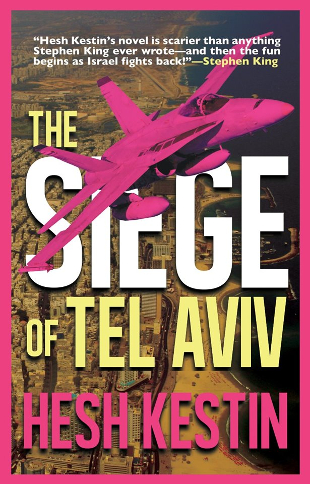
Reflections on Vancouver, British Columbia and other topics, related or not
First they came for
the holocaust revisionists
A publishing company tries
to suppress its own publication
Greg Klein | July 28, 2019
Dzanc Books rejected The Siege of Tel Aviv last April, which was rather bad timing considering that the publisher had already accepted, printed, promoted and distributed the novel. On first impression, objections to the book might seem to have been provoked by Hesh Kestin’s writing, which appears formulaic even to someone who rarely reads thrillers and includes absolutely excruciating American dialogue. But eventually it becomes clear that Dzanc’s decision results from Kestin’s portrayal of Muslims and, really rubbing it in, his exactly opposite portrayal of Jews.
In a horribly tortured rationale, Dzanc co-founder Steve Gillis claimed the book was a parody. His company published the work for that reason, he continued, but was now rejecting it retroactively because readers failed to realize the book’s satiric intent. Gillis even managed to blame root-of-all-evil Trump for causing readers to miss the parody.
Actually readers missed that aspect of the book because it doesn’t exist. Not at all a parody or satire, it’s a relentless condemnation of Muslim inferiority (except for a few very brave and honourable Bedouin) that contrasts starkly with a celebration of Jewish superiority.
Kestin’s Muslims are ignorant, bumbling, bigoted, treacherous, vicious, vicious and above all more vicious. Kestin’s Jews, meanwhile, are wise, inventive, creative, dashing, daring, fair, honourable, admirable and above all exceptional. With an unmistakable lack of subtlety, Kestin proclaims Jewish superiority.
The book’s only positive portrayal of Muslims comes in the planning and execution of their successful invasion of Israel. Their purpose, though, is nothing short of genocide, the thorough slaughter of six million, a number that gets significant repetition.
But, having conquered Israel, why should outright extermination be necessary? Again, it’s Jewish exceptionalism. The book’s characters, whether Jewish, Muslim or neutral, believe Jews hold unique qualities.
Prior to the invasion, some Iranian mullahs fleetingly considered allowing conquered Jews to convert. But, they concluded, “left in place, the clever Jews would win again.”
The novel has the king of Jordan saying, “But these are Jews… Give them another month, another week, perhaps only a day, and they will grow an offensive capability neither you nor I can imagine… these are Jews. They must be destroyed.”
Equating genocide with generosity, the mullahs claim God’s support. “If Allah wished [Jews] to survive then Allah would come to their aid. In the absence of such divine intervention, it was only charitable to cut the Jews down so as to spare them suffering a slow death of thirst, starvation, and disease. In this, Islam would treat its enemies with humane generosity.”
An Iranian officer relishes the idea: “Even the great Hitler did not dream of snuffing out the lives of so many in one day.”
But whether or not they manifest divine will, miracles do take place in this story thanks to (of course) Jewish exceptionalism.
Kestin expresses this supposed trait through other characters too. Israel’s ambassador to the UN describes Jews as “a people whose contribution to the world has never been exceeded by any other people, large or small.”
While haranguing other world leaders to take in defeated Israelis, the U.S. president says, “Folks, we got us six million starving refugees here, and believe me, these people, they get back on their feet and put their biblical heads together, they gonna spark your industries, your sciences, your technologies, your entire economies.”
Then there’s the plot, with a sequence of events that only superheros or Jews, Kestin suggests, could pull off. Meanwhile the Muslim conquerors wallow in incompetence, infighting, looting, mass atrocities and treacherous plans for each other. Shias and Sunnis seethe with mutual hatred. Iranians show contempt towards Arabs and Arabs towards each other, especially Bedouin and very especially Palestinians, hundreds of thousands of whom have already been executed with haste that, disappointingly for their fellow Arab executioners, forestalled prolonged torture.
“If defeat is an orphan, the many fathers of the victory over Israel have settled in for the same sort of dyspeptic discord that marked the neighborhood for centuries as stubbornly unstable, virulently fanatic and rabidly chaotic.”
At the top of this savage hierarchy stands Iran, far more sophisticated than mere Arabs but still in thrall to Russia. Pulling the strings on these Islamic puppets, Russia plans to control the Suez Canal. On Russia’s behalf, Iran will take control of Arab oil by conquering and subjugating all Arab countries, a plan made easier by Arabs’ extermination of Palestinians and Syrians’ extermination of Jordanians. As a Russian officer tells an Iranian, “Together we will remake the world.”
Kestin’s account of Jewish exceptionalism, however, falls short of Zionist Occupation Government. The American president refuses to intervene, other than to help settle Israeli survivors in other lands. “What’s one pissant country compared to ensuring that we and our allies do not run out of the lifeblood of democracy and the American way of life?” The lifeblood is oil.
Israel does get help, though, for example from some extraordinary Bedouin, three rogue American fighter pilots and an armed aid convoy organized by “born-agains,” American fundamentalist Christians: “All they think about is abortion and Israel.”
But this is mostly a celebration of 1948, 1967, Entebbe and Israel’s continued defiance against much bigger enemies. And maybe, given the prominence of the six-million figure, it’s a Just Try That Again fantasy too.
Kestin’s anti-Islamic animus couldn’t be more obvious so if Dzanc found it objectionable, why so embarrassingly late? Maybe Dzanc editors misjudged the ever-changing nature of political correctness, not realizing its relatively recent, occasional tendency to turn against Jews. Or maybe they belatedly feared Charlie Hebdo-style retribution—Gillis sounded desperate when professing his support for Muslim immigration.
Regardless, the book remains available now that Kestin has republished it himself, promoting it as The Book They Don’t Want You to Read. Hype aside, it’s easily available from large retailers and some public libraries, unlike pretty well anything that might cast Jews negatively.
Don’t expect mainstream distribution should someone write a similar novel about a genocidal bloodbath looming in South Africa. A Kestin-like treatment of that scenario would be denounced as a white supremacist hate crime.

